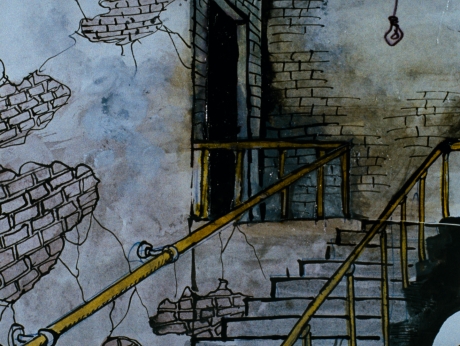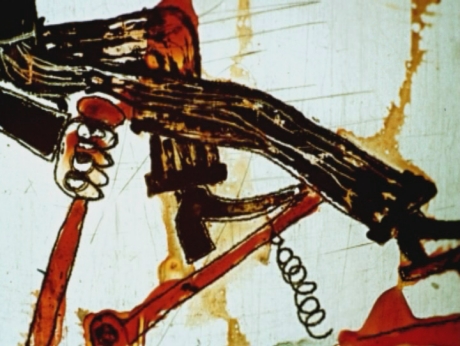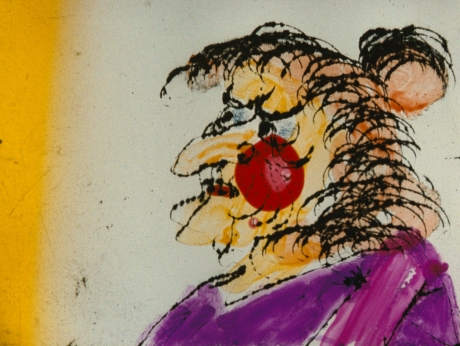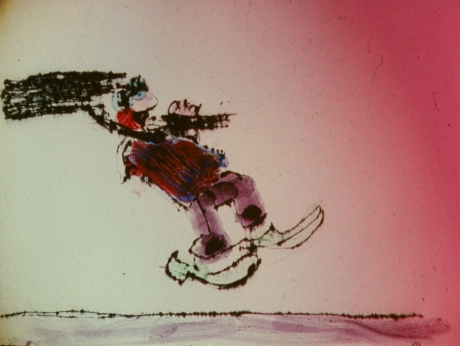
 overview
overview

 storyline
storyline
“Despite our having overcome the crisis and despite the currently prevailing unabashed welfare that is groaning under the weight of ration stamp-bought smallgoods - inform the off-camera commentary’s incipient words - it has been thought reasonable, for the crisis could always recur, to present you, ladies and gentlemen, with the figure of Magister Kiziołł, a bioinventor, (...) who has been to date hailed for his achievements within the veterinarian circles of the Polish Academy of Sciences in Warsaw". Now, you may wonder, what could a local scientist have done that earned him the attention of a director from Cracow, and one who decided to make a whole non-camera movie about him? Let it be known to you that Magister Kiziołł - who incidentally bears a strong physical resemblance to the director himself - had turned from carnivorism to a specific kind of vegetarianism and, what's even more important, has by his strength of will alone grown an additional digestive goitre, which allowed him to chew on and store straw, hay, grass, sawdust, scrap metal, waste paper and even the TV Daily News.

 comment
comment



















Malwina Antoniszczak about the Non-Camera technology.
In the years 1981-1986 a total of 12 issues of the ‘Polish Non-Camera Newsreel’ by Julian Józef Antonisz were published. They began as a pastiche of the official newsreel and later turned into real newsreels themselves. The peculiar, distinctively animated documentaries would reproduce its surrounding reality's most paranoid facts in an entirely individual way. Although both humorous and lukewarm, they were also infused with reflection upon every-day life. Some of the non-camera newsreels’ titles read: ‘Ecology. Zakopane Steelworks’, ‘School of life – caring for our children’, ‘Down with disgraceful abortion!’, ‘Underground nuclear explosions causing earthquakes’, ‘A nation pumped out’.
Some of the newsreels’ themes were later further explored by the artist in his standalone films. The reasons varied – as Antonisz said himself - in some cases the importance of a theme alone caused it to exceed the capacity of the form of a newsreel, but there were also times where the main cause was... simply saving the studio's production schedule. It has to be borne in mind that the Cracow Animated Film Studio, with Antonisz employed as its full time director, was obliged to work within the realm of a socialist planned economy. In case of the threat that scheduled goals may not be accomplished, resulting in the whole crew losing its bonuses, the studio's manager would either ask the perpetually ingenious and operational Alexander Sroczyński for a new issue or turn to the author of the ‘Polish Non-Camera Newsreel’ to elaborate on one of the newsreel’s themes in a self-contained movie. This was how the studio's annual plan was saved numerous times.
In between the respective issues of the ‘Polish Non-Camera Newsreel’, the filmography of Antonisz includes many other titles: ‘Magister Kiziołł’s Additional Digestive Goitre’ (1983), ‘Oberhausen, Duisburg, Dortmund, Düsseldorf, Hannover, Hamburg, or a Non-Camera Coverage of a Journey to the Federal Republic of Germany’ (1984), ‘Would It Be A Free Trade in a Biological Organism?’ (1985) - shot in the formula of the Newsreel and released as special issues on respective subjects (these issues, which were also shot during different socialist occasions, would also appear in the ‘Polish Non-Camera Newsreel’).
The subject of ‘Magister Kiziołł’s Additional Digestive Goitre’ would also prove to play an important role in reality. Since the production of the movie took place both under the state of martial law and after it had ended, the final product was the artist's own vision of overcoming the crisis. Granted, it had failed to gain recognition within the official circles, yet it was later awarded a "Private Award of Three" during the 24th National Short Film Festival held in Cracow.
The movie was made within the poetics of Antonisz's Newsreel, in which a non-camera, shaky imagery is complimented with an off-camera witty commentary and recurring musical breaks, in this case utilizing hard rock music.
There's also a certain undercurrent to ‘Magister Kiziołł’s Additional Digestive Goitre’ for, despite all of it's wit, it also advocated self-sufficiency, for Antonisz considered the non-camera not only a technique, but a way of life. Non-camera, or - as he would say - do it yourself. Speaking not only in the terms of film-making. Jerzy Armata